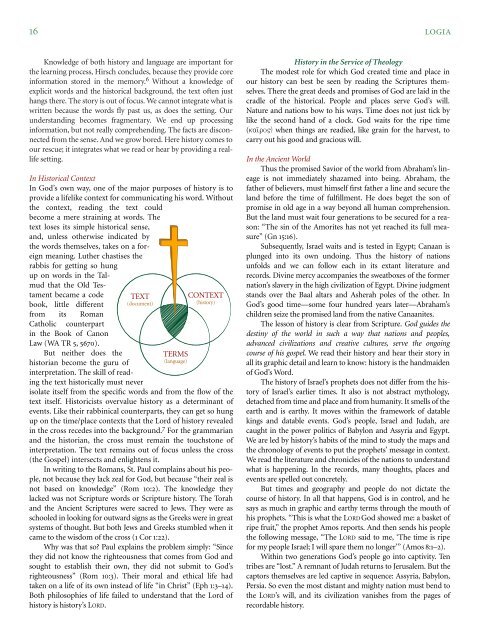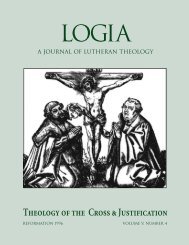04-2 Hermeneutics.pdf
04-2 Hermeneutics.pdf
04-2 Hermeneutics.pdf
- No tags were found...
You also want an ePaper? Increase the reach of your titles
YUMPU automatically turns print PDFs into web optimized ePapers that Google loves.
16 LOGIAKnowledge of both history and language are important forthe learning process, Hirsch concludes, because they provide coreinformation stored in the memory. 6 Without a knowledge ofexplicit words and the historical background, the text often justhangs there. The story is out of focus. We cannot integrate what iswritten because the words fly past us, as does the setting. Ourunderstanding becomes fragmentary. We end up processinginformation, but not really comprehending. The facts are disconnectedfrom the sense. And we grow bored. Here history comes toour rescue; it integrates what we read or hear by providing a reallifesetting.In Historical ContextIn God’s own way, one of the major purposes of history is toprovide a lifelike context for communicating his word. Withoutthe context, reading the text couldbecome a mere straining at words. Thetext loses its simple historical sense,and, unless otherwise indicated bythe words themselves, takes on a foreignmeaning. Luther chastises therabbis for getting so hungup on words in the Talmudthat the Old Testamentbecame a codebook, little differentfrom its RomanTEXT(document)Catholic counterpartin the Book of CanonLaw (WA TR 5, 5670).But neither does thehistorian become the guru ofinterpretation. The skill of readingthe text historically must neverTERMS(language)CONTEXT(history)isolate itself from the specific words and from the flow of thetext itself. Historicists overvalue history as a determinant ofevents. Like their rabbinical counterparts, they can get so hungup on the time/place contexts that the Lord of history revealedin the cross recedes into the background. 7 For the grammarianand the historian, the cross must remain the touchstone ofinterpretation. The text remains out of focus unless the cross(the Gospel) intersects and enlightens it.In writing to the Romans, St. Paul complains about his people,not because they lack zeal for God, but because “their zeal isnot based on knowledge” (Rom 10:2). The knowledge theylacked was not Scripture words or Scripture history. The Torahand the Ancient Scriptures were sacred to Jews. They were asschooled in looking for outward signs as the Greeks were in greatsystems of thought. But both Jews and Greeks stumbled when itcame to the wisdom of the cross (1 Cor 1:22).Why was that so? Paul explains the problem simply: “Sincethey did not know the righteousness that comes from God andsought to establish their own, they did not submit to God’srighteousness” (Rom 10:3). Their moral and ethical life hadtaken on a life of its own instead of life “in Christ” (Eph 1:3–14).Both philosophies of life failed to understand that the Lord ofhistory is history’s LORD.History in the Service of TheologyThe modest role for which God created time and place inour history can best be seen by reading the Scriptures themselves.There the great deeds and promises of God are laid in thecradle of the historical. People and places serve God’s will.Nature and nations bow to his ways. Time does not just tick bylike the second hand of a clock. God waits for the ripe time(kai'ro") when things are readied, like grain for the harvest, tocarry out his good and gracious will.In the Ancient WorldThus the promised Savior of the world from Abraham’s lineageis not immediately shazamed into being. Abraham, thefather of believers, must himself first father a line and secure theland before the time of fulfillment. He does beget the son ofpromise in old age in a way beyond all human comprehension.But the land must wait four generations to be secured for a reason:“The sin of the Amorites has not yet reached its full measure”(Gn 15:16).Subsequently, Israel waits and is tested in Egypt; Canaan isplunged into its own undoing. Thus the history of nationsunfolds and we can follow each in its extant literature andrecords. Divine mercy accompanies the sweatboxes of the formernation’s slavery in the high civilization of Egypt. Divine judgmentstands over the Baal altars and Asherah poles of the other. InGod’s good time—some four hundred years later—Abraham’schildren seize the promised land from the native Canaanites.The lesson of history is clear from Scripture. God guides thedestiny of the world in such a way that nations and peoples,advanced civilizations and creative cultures, serve the ongoingcourse of his gospel. We read their history and hear their story inall its graphic detail and learn to know: history is the handmaidenof God’s Word.The history of Israel’s prophets does not differ from the historyof Israel’s earlier times. It also is not abstract mythology,detached from time and place and from humanity. It smells of theearth and is earthy. It moves within the framework of datablekings and datable events. God’s people, Israel and Judah, arecaught in the power politics of Babylon and Assyria and Egypt.We are led by history’s habits of the mind to study the maps andthe chronology of events to put the prophets’ message in context.We read the literature and chronicles of the nations to understandwhat is happening. In the records, many thoughts, places andevents are spelled out concretely.But times and geography and people do not dictate thecourse of history. In all that happens, God is in control, and hesays as much in graphic and earthy terms through the mouth ofhis prophets. “This is what the LORDGod showed me: a basket ofripe fruit,” the prophet Amos reports. And then sends his peoplethe following message, “The LORD said to me, ‘The time is ripefor my people Israel; I will spare them no longer’” (Amos 8:1–2).Within two generations God’s people go into captivity. Tentribes are “lost.” A remnant of Judah returns to Jerusalem. But thecaptors themselves are led captive in sequence: Assyria, Babylon,Persia. So even the most distant and mighty nation must bend tothe LORD’s will, and its civilization vanishes from the pages ofrecordable history.
















